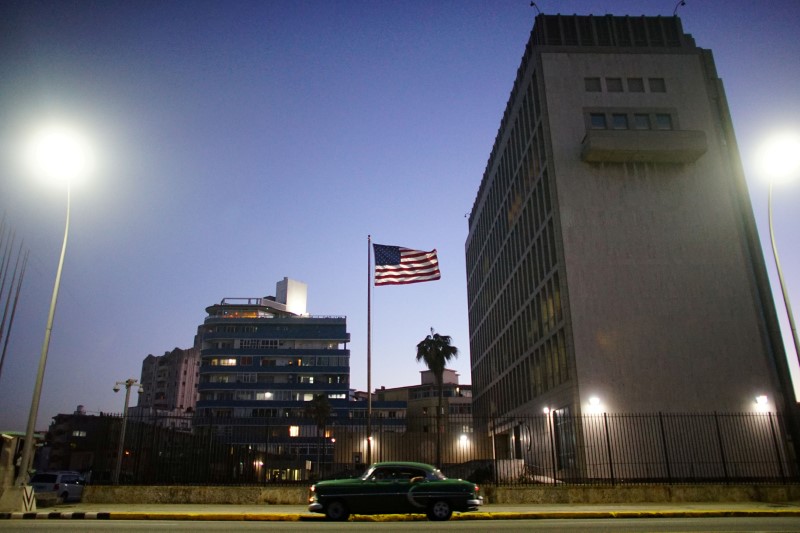By Matt Spetalnick and Patricia Zengerle
WASHINGTON (Reuters) - The United States is crafting a plan for a drawdown of staff from the American embassy in Havana in response to still-unexplained incidents that have harmed the health of some U.S. diplomats there, U.S. and congressional officials said on Thursday.
The State Department's plan, which was being finalized and could be announced within days, would call for the departure of non-essential staff and diplomats' families, the sources said.
But it was unclear whether leaving the island would be voluntary or compulsory, and one U.S. official said some details were still being worked out.
U.S. officials say 21 U.S. diplomats and family members have been afflicted by health problems of unknown origin, including hearing loss, dizziness and nausea. Several Canadians have also been affected in Cuba, a Canadian official has said.
The Cuban government has denied any role and is conducting an investigation. But it has so far said it has been unable to determine the cause.
Proposals for a drawdown have moved forward since U.S. Secretary of State Rex Tillerson met Cuban Foreign Minister Bruno Rodriguez in Washington on Tuesday to discuss the case, which has been threatening the already fragile detente between the two former Cold War foes.
The State Department is expected to stop short of saying it will close the recently reopened embassy because of the mysterious affair, despite Tillerson having said last week that such a move was under consideration.
But a partial evacuation, even one depicted by the Trump administration as a safety measure, would also send a message of U.S. displeasure over Cuba’s handling of the matter and deliver another blow to Obama-era engagement policies with Havana.
CONGRESSIONAL STAFFERS BRIEFED
U.S. State Department spokeswoman Heather Nauert told reporters Thursday that Tillerson – who is now on his way to Beijing - was reviewing all of his options for “how to best protect our American personnel” in Cuba and that she was not ready to announce any decision.
But congressional staffers were briefed on the plan on Thursday, two congressional sources said.
Republican U.S. Senator Marco Rubio, a harsh critic of the Cuban government, hinted at the State Department’s coming decision. “Any reduction of Americans from @USEmbassyHavana should also require equal number of Castro employees leaving regime's embassy in U.S.,” he said in a message on Twitter.
The State Department declined comment. McClatchy news service was the first to report this week that the United States would soon begin a major withdrawal of Havana staff.
Depending on how many diplomats leave, the Havana embassy – the main point of contact for U.S. citizens visiting the island as well as American companies doing business there – could be left with more of a skeletal staff to handle responsibilities.
Though Washington has not cast direct blame on Cuban authorities, the State Department said Tillerson reminded Rodriguez at Tuesday’s meeting of Cuba’s obligation to protect diplomats and their families.
In the highest-level U.S.-Cuba meeting since President Donald Trump took office, Rodriguez warned the United States against taking hasty decisions and urged Washington to cooperate with its ongoing investigation. Washington earlier this year expelled two Cuban diplomats over the alleged incidents.
The case has brought simmering tensions between the two countries since Trump took office to the boil.
Trump, who in June vowed to partially roll back the detente with Cuba agreed by his Democratic predecessor, President Barack Obama, called the Cuban government "corrupt and destabilizing" in his address to the United Nations General Assembly last week.

He said he would not lift the U.S. trade embargo on the Caribbean island until it made "fundamental reforms." Cuba described his comments as "unacceptable and meddling."